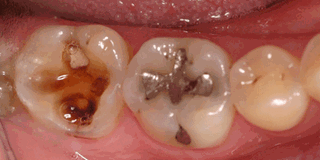What causes tooth sensitivity after a fill?

A tooth that is filled using the wrong material can cause pain and sensitivity. File Photo
Filling a tooth is both curative and preventive. It can prevent a person’s tooth structure from getting further damage, as well as relieve pain.
However, many people still fear to have their tooth filled with dental cement because of myths and false information that usually involves the process. Ideally, a dental filling should not cause pain, sensitivity or any form of discomfort, especially if it is done by a professional. But there are cases when a filling is carried out and a person complains that their tooth has become sensitive, or is painful. This can be due to a number of reasons.
Wrong diagnosis
This happens when a dentist makes a wrong diagnosis, prescribing the wrong filling material. As a result, a person ends up having their tooth filled with dental cement that is not appropriate for a particular tooth. This may lead to a negative reaction to the inner part of the tooth (pulp), causing pain or sensitivity. A wrong diagnosis can also happen when a person provides the dentist with wrong information. Often times, the dentist is guided by the information that a patient gives at the time of examination or check-up. However, some of the problems with the tooth in question can be ruled out by further diagnostic investigation such as the use of a dental x-ray.
Lack of expertise
This is when you have your tooth filled by a person who lacks skills and knowledge in dental restorations. It may be a quack or a dental professional who lacks certain skills in using a particular dental filling material. It is always advisable to seek treatment from a qualified and trusted professional.
Leakage
This happens when a tooth is filled but a small opening still exists, especially at the boundaries of the cavity. This leakage may happen immediately after a filling, or several days later.
Other causes of sensitive teeth
When a person insists on filling a tooth yet it requires another form of treatment such as root canal, it can lead to teeth sensitivity. If the dentist does not have the skills for other forms of treatment, yet the patient needs to retain the tooth, such negative side effects of pain or sensitivity may occur.
Sometimes, patients do not follow advice from the dentist, especially when they are told to seek further treatment, as they believe they have already gone through the process, or have no money to do so.
It is therefore important that you notify your dentist in case anything contrary to what you expected after treatment happens to your tooth.
The writer is a dentist [email protected]




